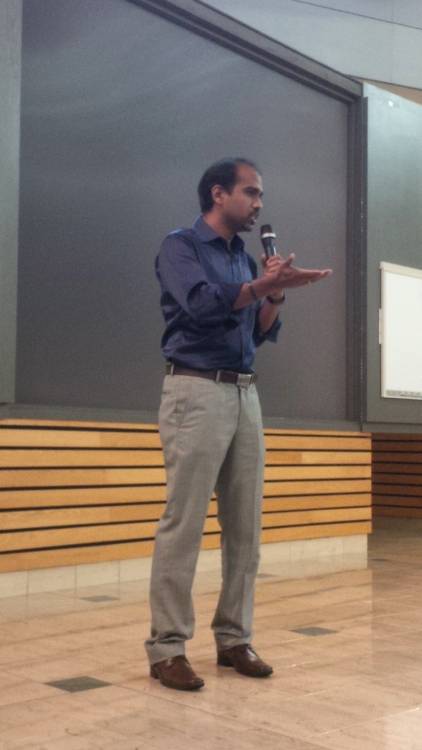Anand Inbasekaran was born in India and lived and worked in Singapore, and now he’s just finishing up his MBA at Rotman School of Management in Toronto. His location isn’t the only aspect of his life that’s changed in the past few years: he made the career switch from software project development to consulting. When he graduates from Rotman in May 2015, he will assume a position at a consulting firm. He talked to FIND MBA about the trials and triumphs of moving to a new country and switching his career.
Can you give me more detail about your background and why you chose to go to Canada?
I have a dual engineering degree from India from Anna University; I did a degree in civil engineering and information tech. I worked in India for almost six years; I began my career as a project developer then was more into project management. In India I was with Merrill Lynch, but then I had a chance to travel abroad a few times, which gave me a lot of new insights. That made me decide that I wanted to work outside India for a while. To get that prospect I moved to Singapore, and I was working at Barclay’s. It was interesting work, but then after being at Barclay’s for two years I wanted to try something new.

I was researching where to do an MBA. Europe was interesting to me— but then Europe was not in a good situation, with the financial downturn and a lot of job opportunities missing there. I thought it wouldn’t be a good risk to take, so I looked to Asia or North America. But there’s more of an all-Asian mix in Asia, so I thought I wouldn’t learn anything new, so that’s why I chose North America. I applied to top schools in North America….I believed I would get lots of experience and value being in Toronto for two years.
Can you tell me about your experience as a family man in Toronto, with a seven-year-old, a baby and a wife? Have you encountered any challenges balancing your family and your career?
The first year of Rotman was a lot of work. I think that applies to many schools. They wanted to get the basics and the foundation ready in the first year. There’s a lot of learning that happens in the first year. It would be hard for me to juggle my family and my work during the first year, but my wife was understanding and she said she was going to be in India for the fist year. The plan was that once I got everything done, she would come over. And it worked really well. I got an internship at Proctor and Gamble, and I took that as a good sign, so I brought them over.
My advice to family men coming to Toronto, or not just to Toronto but to an MBA, is to think about the work there. I think other friends of mine who brought families here during the first year are not much engaged with the MBA program. That engagement is very much required. You’re quitting your job, you’re doing education. It’s best not to bring your family over right away, but if you have family already here [in Toronto] to support you that works really well.
What are some tips for international candidates who are applying to Canadian MBA programs?
First tip: be focused. The reason why I’m saying be focused is because the opportunity for exploring different options is already there in the US because it’s a bigger market. For example, you could be a software engineer but want to be a finance person. You could explore that and probably end up in a management consulting position. But that’s very hard in Canada. The job market is small and Canadian employers value specialized education.
Generally, I advise Rotman students that they should know what they are going to do by November. They can spend those three months talking to people, consulting with professors, and then they can say okay, I’m going to be a consulting manager, this is where my skills are, this is my passion.
Second thing is, network. For an international student coming from India, where the job market is big, you don’t really network with people. You have your friends but you don’t really talk to strangers just for the sake of a job. That culture is not there in India or in China. The concept of networking is completely odd when it comes to international students. The best way to start is with your school’s alumni, use them as connections, talk to the professional industry and people who are making decisions about hiring or not. I think that’s where most of the jobs come from. Around 60 or 70 percent of people end up getting jobs through networking.
Did you know you wanted to go into consulting, or was this a choice you made during the program?
I was exploring. But the only focus I had was, I don’t want to change industry. My industry was going to be tech, the reason being I had eight years of experience and I knew how tech companies operate. I know their problems and their challenges.
The second thing is the functional. For example, I could be in marketing or in sales. I attended many sessions that Rotman organized, and I talked to many industry pros to see what would be an interesting job for me. I realized that consulting would be a natural job for someone who's started a career as a software engineer, because you are meant to solve problems. I already had a skill that could be applied to different areas, and I chose tech consulting. Then I obviously learned strategy from my MBA. So again, being focused.
What are your long term career goals?
I’ve been building expertise and learning tech, but I don’t have breadth, breadth being just solving problems quickly and moving on to the next. Once I have depth and breadth I can push myself further. My long term goal in the next ten years is to start my own company. That’s still a passion for me. I’m using this consulting job that I’m taking after my MBA as a tool to find out where my problem-solving strength is. Then I will use that to start building my own company.
This interview has been edited for length.










